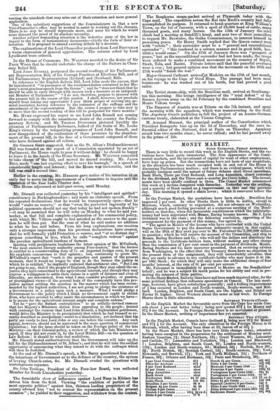Mr. Disraeli was reelected yesterday by his " intelligent and spirited "
constituency in Buckinghamshire ; and made an elaborate speech. From his repeated declarations that he would be transparently open—that he would "make no reserve," so that "even the perverted ingenuity of his political opponents should not say that today he had not spokenfrankly" —it may be surmised that he will refer on Monday to what he said yes- terday, as that full and complete explanation of his commercial policy, with which Mr. Villiers ought to feel satisfied as the answer to the ques- tion he will then put. But the sum of what he said makes no addition to what he has said before. From his long explanations one receives only a stronger impression than his previous declarations have created, that he will formally yield Protection co nomine, and " at no distant day" prbpose something in lieu, which he calls "complete redress" against the peculiar agricultural burdens of farmers. Quoting with periphrastic laudations the latest opinion of Mr. M'Culloch, 4' the most eminent literary authority among Free-traders," that the farmer is entitled to a countervailing duty of 7s. on imported foreign corn, he gave his emphatic concurrence to that opinion ; but, continuing to quote Mr. M'Culloch's regret that "such is the prejudice and passion of the present moment, that it would no longer be wise to do the farmer the juetice to which he is entitled," he imphedly endorsed that sentiment also. "But I am not going to say, that if the people of England, though they may admit the in- justice they have committed to the agricultural interest, and though they may express a willingness to settle their claims in a spirit of fairness and even of liberality, are determined, from what I may consider prejudice, or passion, or_shortaighted views—if the general body of the community have this pre- judice against settling the question in the manner which has been recom- mended by the highest authorities, I am not going to pledge the existence of a Government or a policy upon such a measure. What I would pledge a Government to—the policy which I think no Government ought to shrink from, who have acceded to office under the circumstances in which we have— is to secure for the agricultural interest ample and complete redress." Yet he "gave the flattest contradiction "to an artfully-devised rumour that her Majesty's Ministers shrink from appealing to the people; treated with contempt the rumour that Lord John Russell, a highminded gentleman, would drive the Ministry to do precipitately that which he had himself so re- cently described as inexpedient—resort to a dissolution ; yet declared that his party are ready to face Lord John or any one before the country. Any such appeal, however, should not be narrowed to the mere question of commercial legislation ; but the issue should be taken on the Foreign policy of the late Ministry—on their Colonial policy, a review of which the late Ministers es- caped, if they did not evade it, by the Local Militia Bill—on the question of Law Reform : it should be wide and multiform.
Mr. Disraeli stated authoritatively that the Government will take up the bill for the Disfranchisement of St. Alban's; and that he will take the earliest opportunity of announcing what they intend to do with the suffragea which will then be forfeited.
At the end of Mr. Disraeli's speech, a Mr. Barry questioned him about the intentions of Government as to the defence of the country, the system of levying Church-rates, &e. Mr. Disraeli evaded the questions with contemptuous repartee.
Sir John Trollope, President of the Poor-law Board, was reelected Member for South Lincolnshire yesterday.


























 Previous page
Previous page